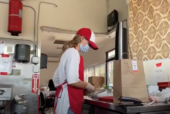Higher education institutions have been conducting classes virtually for almost a year, but with COVID-19 vaccinations now being distributed, how close are colleges and universities to resuming in-person instruction?
Governor Gavin Newsom and state legislative leaders have already reached a deal aimed at encouraging K-12 schools to reopen this school year. The CDC has also released information that advises schools on how to prepare for reopening.
At the college level, California State University Chancellor Joseph Castro stated that the system’s campuses are planning to return by fall of this year. He says each campus will have an individualized reopening plan.
Like a number of other schools, Cal State Northridge officials will not require students or faculty to get vaccinated.
Maurice Walker, a student at College of the Canyons who is immunocompromised, says he does not feel ready to return to campus. He would want to wait at least another six months.
“It will be a while before I feel comfortable being on campus, but I can’t let my paranoia get the best of me,” Walker said.
CSUN nursing student Samuel Sherry says it is natural for people to be concerned about getting the COVID-19 vaccine, considering that it was created so quickly.
“I am hopeful, for the most part, that over time people will realize that [the vaccine] is for the best,” Sherry said. “The side effects are minimal. Everybody needs to do their part and get vaccinated if they can, and when they can to get to that level of herd immunity.”
Matthew Cahn, CSUN Vice Provost of Academic Affairs, says university officials aim to have at least 30 to 50 percent of classes back on campus. Most of these classes will be hybrid, meaning that they will meet both on campus and virtually.
“The idea is to get as many students as possible to have the opportunity to have some kind of campus experience in Fall ‘21,” Cahn said.
If in-person instruction does resume, staff and students are not required to return if they feel their safety is at risk.
“We are not creating any expectations that students must be on campus.” Cahn said. “We hope that those who want to [return] will have the opportunity to do so.”
CSUN marketing professor Mariam Beruchashvili said she believes students and staff should be vaccinated before campus operations fully return to normal, but she understands that there are a lot of people who want to wait some time before receiving the vaccine.
“It’s a very complex issue with multiple layers, and it will be a challenge.” Beruchashvili said. “I don’t think that many people will volunteer to be vaccinated and that means that we might not be able to go back to full capacity.”
“A place like a college university is probably not one of the safest places to reopen,” added Sherry, “just because it has so many individuals in it.”
The pandemic has also taken a toll on the social lives of many students, so a return to campus could help bring back that missing interaction.
“Even with the six foot rule, I think we’ll have an inclination for [social life] to flourish.” Walker said. “We’re deprived of true intimate communication and interaction. We desire it.”
Students and staff that decide to return to campus must follow all safety protocols, such as wearing masks and maintaining physical distance from others.
This story was reported by the following team:
- Angela Gonzalez
- Kristyn Karmazyn
- Elizabeth Medina
- Daniela Torres
- Bryce Wayne
CORRECTION (Tues., March 2): Due to an editing error, an earlier video version of this show included an on-screen graphic in which guest Samuel Sherry’s name was misspelled. We’ve since corrected the video. CSUN On Point regrets the error.

 Tweet this Video
Tweet this Video Share on Facebook
Share on Facebook Share via E-mail
Share via E-mail

